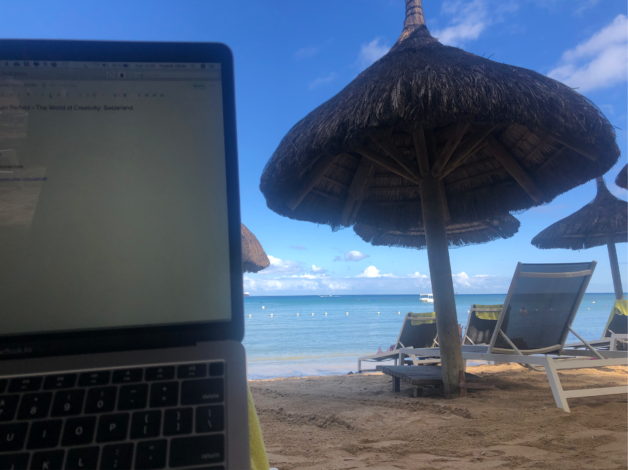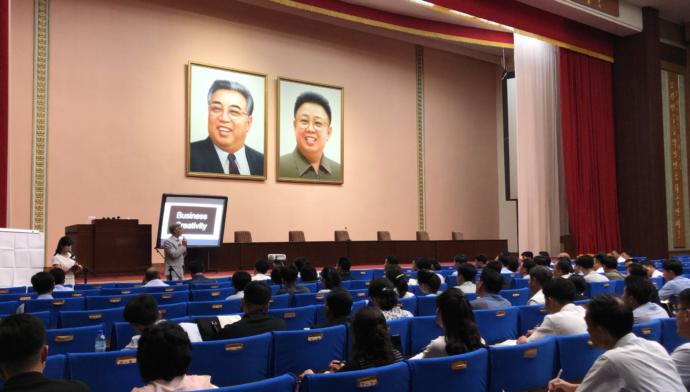
Today I want to talk about saying “yes” to saying “no”.
In the last 12 months I did 160 (!) free (!) one-on-one meetings with speakers who wanted help to find their Inner Theme, wanted help with developing their speaking business or with becoming better as a speaker.
In the next 12 months I plan to do almost less than one per week.
My financial year starts 1 September and I have decided that beginning 1 September I will drastically reduce the number of one-on-one meetings I have with people who want to meet with me and discuss how to take their speaking career to the next level.
In this post I want to explain why.
It is not about suddenly not wanting to help.
Anyone who knows me knows that I am passionate about helping others become better speakers:
1) I wrote a book about how to become a global keynote speaker (called “Spread Your Message, See the World: How to become a global keynote speaker”) to share my insights (and you can get the book on Amazon for just 3:17 $ (https://www.amazon.com/Spread-Message-World-Keynote-Speaker/dp/1642491187/ref=sr_1_1?keywords=how+to+become+a+global+keynote+speaker&qid=1565933348&s=gateway&sr=8-1) or email me at fredrik@fredrikharen.com and I will send you the book for free.
2) I blog on ProfessionalSpeaking.com where I have about 250 blog posts on all kinds of aspects on how to grow a successful speaking business. All the posts are free.
3) And I am very involved in the professional speaking community, right now serving as Immediate Past President of APSS (AsiaSpeakers.org).
4) I just today launched a free membership community connected to the ProfessionalSpeaking.com blog where I will answer question from the community. Join that group and you can ask as many questions as you like and as a bonus you also get to see all the questions and answers from everyone else!
Join here: https://www.facebook.com/groups/393306341267169/?source_id=1677915579199975
But, last year, apart from spending a lot of time being President of APSS I also spent a lot of time meeting one-on-one with all kinds of people.
In fact I did 160 one-on-one meetings, for free, on top of all the Presidential work of running a speaker association. That is the equivalent of one month of full-time work.
But I realised that the more I gave away for free the more people wanted to meet up and get even more information for free. And in the last 12 months I went all in and said yes to every single request to meet up. I said yes, yes and yes.
But starting today I am saying no. Not for ever, but for one year.
I will now only do one free one-on-one per week (except the weeks I am on vacation). First come, first serve. If you are interested email me at fredrik@fredrikharen.com.
(So even if I drastically reduce the free sessions to 40 this next coming 12 months it still means that on average I will have done 100 (!) free one-on-ones over a two year period which puts me – most likely – in the top 1% or 0.1% of speakers dedicating time to help other speakers. 😉
So why am I suddenly saying “no”.
Because I need the time to write.
I have decided to write not one – but two – new books over the next 24 months, and writing books – or more specifically doing research for books – takes a lot of time.
By temporarily reducing my pro-bono mentoring time I am freeing up loads of time that I will use to make these books great.
By saying “no” to others I am saying “yes” to myself.
My freeing up time I am creating creativity-time.
What do you need to say “no” to in order to say “yes” to the things you want to say yes to?
ps. To clarify:
This is not about me stopping to help speakers.
Helping speakers become better give me so much joy.
But for the next 12 months I will do it through other channels than one-on-one “meet-up-for-coffee meetings”.
(But as mentioned below I have instead created a Facebook group where I will continue to answer your speaking questions: Join the free Facebook group here. (https://www.facebook.com/groups/393306341267169/?source_id=1677915579199975)
PPS. Picture of me last week on a beach in Mauritius writing one of my new books. Focus, focus, focus. 😉

Earlier this month I had the opportunity to speak in Pyongyang in DPRK (or North Korea as many people know it). I was part of a group who spoke at a conference on Urban Innovation for about 200 delegates from different part of North Korean society.
Speaking in North Korea is a challenge because as a speaker you do not know how much the audience will know about the examples, stories and case studies that you normally present in your speech, so speaking there became an excellent reminder of the need to use the contact points you have before the speech to get as much knowledge as possible about the audience.
Knowing your audience is always important, but when speaking to North Koreans it became so clear how important researching the audience is before every speech.
Research on the Internet can give you some information about the audience, but I find that personal conversations with people who know the audience is the most valuable.
So on my trip to Pyongyang I made sure to:
- Interview previous people who had spoken at this conference to hear their experiences and get their advice.
- Talk to the client of the organisation which organised the event. (Speaking with the client if of course a no-brainer,)
- Make sure I sat next to the translator at the speaker dinner the night before so I could get more information about the country, the audience and the conference (she had translated for this conference before)
- Ask questions from the government representative who was always with us about what he thought I should know.
- Talk to the other speakers who spoke at this conference about how they had prepared and what they had learnt about the group
- Make sure that I got the views from the client of the local organisation who co-organised the conference
- Also interviewed another translator who I got a chance to meet with.
- Network with delegates during the opening of the conference to get some last minute insights about what they wanted to learn and find out more about where they came from.
Eight different touchpoints that all gave me valuable insights into the group I would be talking to.
The more you know about your audience the better you will be as a speaker. It is true for speaking in North Korea, and it is true for speaking anywhere else on Earth.